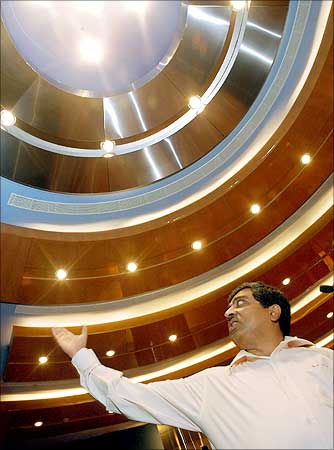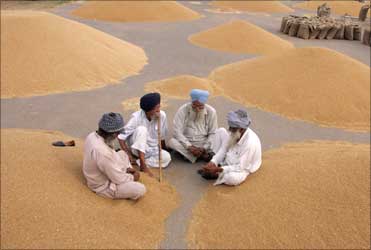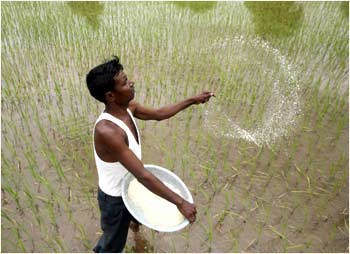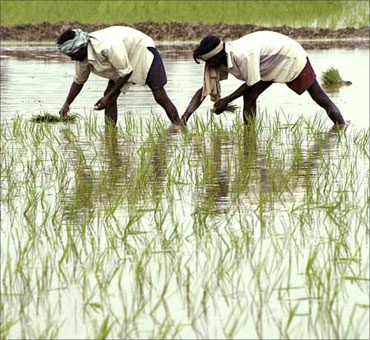Photographs: Jagadeesh Nv/Reuters
As the government works out the modalities for implementing direct transfer of subsidies on cooking gas, fertilisers and kerosene, a task force headed by Nandan Nilekani has proposed a three-stage model for direct transfer of food subsidy.
The rollout of direct transfer of food subsidy will be contingent on a modern and computerised public distribution system, for which Nilekani has suggested a centralised network. 'Aadhaar' numbers, currently being rolled out across the country, will form an integral part of the transfer, just as in the case of fuel and fertilisers.
The draft report on direct transfer of fuel and fertliser subsidy was submitted earlier this month, following which the government asked Nilekani to also prepare a blueprint for the direct transfer of food subsidy.
. . .
Food subsidy transfer: Nilekani's 3-step mantra
Image: Nandan Nilekani.Photographs: Rajesh Karkera
| SUBSIDY SUGGESTIONS |
| * The rollout of direct transfer of food subsidy will be contingent on a modern and computerised public distribution system, for which Nandan Nilekani has suggested a centralised network |
| * 'Aadhaar' numbers, currently being rolled out across the country, will form an integral part of transfer |
| * In the first phase, a centralised national information organisation called the public distribution system network will be rolled out |
| * In the second stage, Nilekani proposes to release the first version of the model PDS software |
| * The third phase will be to support direct transfer of subsidy by integrating it with the core subsidy management system |
. . .
Food subsidy transfer: Nilekani's 3-step mantra
Image: Farmers sit beside heaps of wheat at a grain market in Chandigarh.Photographs: Ajay Verma/Reuters
According to the preliminary blueprint prepared by Nilekani, which was recently shared with officials from the food ministry, in the first phase, a centralised national information organisation called the public distribution system network will be rolled out.
This will develop a common national software for PDS, which will be configurable based on the needs of the states.
The need for direct transfer of food subsidy and PDS reforms are also key components of the proposed food security bill.
PDSN will adopt the best practices on PDS from states and incorporate it in the model.
. . .
Food subsidy transfer: Nilekani's 3-step mantra
Photographs: Reuters
It will build and operate the common PDS platform professionally.
The network will be run by a professional board and will have a CEO.
However, as states have a big stake in PDS, they will also be equal stakeholders along with the Centre in the proposed network. States will also be free to join the network on their own.
"If a state does not have an existing information technology platform it can leapfrog to the ready-to-use solution as being provided by the PDSN," the model suggested.
. . .
Food subsidy transfer: Nilekani's 3-step mantra
Photographs: Reuters
Those states which already have an information technology-enabled PDS model or are working on it can use the models suggested by PDSN for payment gateways, fraud detection, and retaining their own system at the same time.
In short, PDSN will work as a nodal centre for helping states modernise their PDS network and will have ready solution for all needs.
Its formation can run concurrently with the enrollment of beneficiaries through Aadhaar numbers.
In the second stage, Nilekani proposes to release the first version of the model PDS software, which will ensure transparency in the PDS supply chain.
. . .
Food subsidy transfer: Nilekani's 3-step mantra
Photographs: Reuters
The third and the final phase will be to support direct transfer of food subsidy by integrating it with the core subsidy management system, as has been suggested in the case of fuel and fertiliser subsidy transfer.
CSMS will maintain information on entitlements and subsidies for all beneficiaries.
It will also have details on level of stocks, likely demand in each state and could also be used for grievance redressal.
The unique point of direct transfer of food subsidy will be that the model will support any form of subsidy transfer.
The task force is expected to suggest a IT strategy for PDS reforms and direct transfer of food subsidy by the end of August.








article